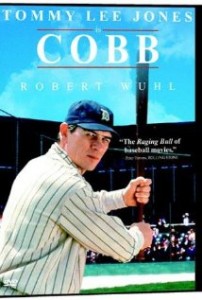From the Chicago Reader (November 22, 1994). — J.R.
Writer-director Ron Shelton’s fourth feature (Bull Durham, Blaze, and White Men Can’t Jump are the other three) is a shambles, but it’s such a potent and courageous wreck of a movie that it’s worth more than most successes. Only obliquely a sports story, and missing most of Shelton’s usual humor, this is a troubled portrait of an odious Ty Cobb, possibly the greatest of all baseball players, from the vantage point of the last year or so of his life. Based on the recollections of Al Stump, who ghosted Cobb’s self-serving and unreliable 1961 autobiography, the film fails to make either Cobb or Stump fully believable, despite a towering performance by Tommy Lee Jones as the former and a perfectly adequate one by Robert Wuhl as the latter. In part that’s because Shelton, hampered in his efforts to shift between the two characters’ points of view, is actually after bigger game: a critique of the American success ethic and the preference for legend over truth. (In many ways, the story has more in common with The Man Who Shot Liberty Valance than with any other sports biopic.) The sheer, dark unpleasantness of what emerges is such that at certain moments even Shelton backs away from it and tries to wring out a sentimental tear or two (along with a belated Freudian revelation). But those attempts don’t wash; the abrasive moral ugliness of this Cobb is what sticks in our gut. With Lolita Davidovich (1994). (JR)

